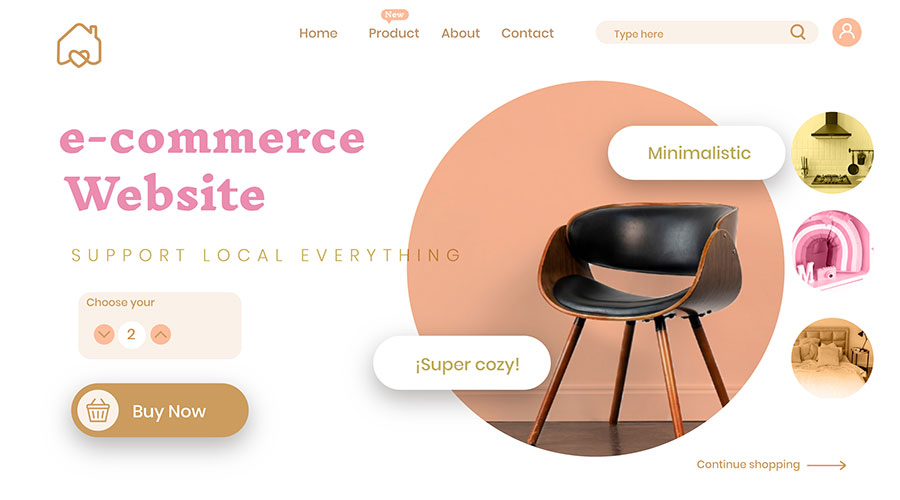Over 100,000 marketers in our community! Let's talk about your technology and marketing events/webinars in our community. Learn More
E-Commerce Templates for Niche Markets
Originally published: April 08, 2025 10:15:48 AM

For niche e-commerce companies, standard website templates usually do not reflect the true nature of their specific markets. These companies need templates that surpass basic functions, providing features customized for their specific workflows and target audiences. An e-commerce template with proper design and tools can be the starting point for an interactive shopping experience that surpasses customer expectations. Here’s how to find the ideal template that seamlessly matches your brand’s unique requirements.
Personalized Design for Brand Identity and User Engagement
Niche markets thrive on specificity, and your website’s look should reflect that. A template created for a specialty shop should be in harmony with your brand's visual identity and the aesthetic preferences of your target market. This harmony creates a consistent and compelling experience that reinforces brand recall. It also makes the website emotionally engaging, creating deeper connections and loyalty from your target market. For example, a boutique tea house targeting health enthusiasts should incorporate earthy tones, serene imagery, and clean designs, inducing calmness.
Apart from visuals, specialty e-commerce templates need to emphasize storytelling. Product origin, artisan stories, or ingredient sourcing are some features that help instill trust and emotional connection. These storytelling elements provide context that builds credibility and transparency with customers. For instance, a handcrafted jewelry template could include interactive timelines showing the manufacturing process, and an eco-fashion brand could add eco-certification badges in product descriptions. These design elements aren’t just superficial visual additions; they communicate your values and differentiate you from generic competitors.
Niche-Specific Functionality for Seamless User Experience
A template’s performance will make or break a niche store’s usability. Specialty stores generally have needs that large platforms do not address. For instance, a template applied to a subscription service gourmet coffee store will require built-in mechanisms for automatic recurring payments, taste profile surveys, and shipping schedules. Conversely, a vintage vinyl record store template must incorporate mechanisms for more in-depth genre search filtering by decade or condition and integrate with third-party authentication interfaces.
Consider your niche’s unique workflows. For instance, a pet bakery might need a template that supports user-defined pet profiles(input of allergies or dietary needs) and a “Treat Builder” feature for custom orders. In specialty niches like DIY craft kits or furniture modules, 3D product viewers or in-product page step-by-step assembly guides can reduce returns and build customer confidence. The goal is to eliminate friction points that generic templates cannot solve, making every click intuitive and purposeful.
Scalability and Integration with Niche Tools
Niche businesses often rely on custom tools to manage operations, from inventory control for unusual collectibles to CRM systems for personalized client interaction. Your template must natively support integrating with these tools to avoid operational bottlenecks. For example, an upmarket watch re-seller template must integrate synchronously with authentication APIs and real-time market price feeds. A template for a specialty bookstore might integrate with platforms like independent author databases to enable restocking.
Scalability is just as important. As your niche business expands, your template should be able to evolve without the need for an entire overhaul. Find modular templates to build on features such as loyalty schemes, wholesale sections, or multi-vendor marketplaces when necessary. For example, a small-batch skin care brand template may begin with a simple e-commerce functionality but extend to incorporate a subscription model, ingredient transparency widgets, or even a virtual consultation option.
Endnote
For niche e-commerce sites, success is about creating an online experience that resonates deeply with a specific group of people. A generic template won’t cut it. Your site must reflect your brand and fulfill your client’s unique requirements. The right template makes these processes easier, eliminating friction points and enhancing the user experience. By integrating design, features, and workflows with your niche, you create a frictionless shopping experience. This ultimately fosters loyalty and makes your brand stand out, turning casual browsers into loyal customers.
Join over 100,000 SEO and Google Ads experts. We provide a community to help you engage and learn from industry experts and influencers. Join Now
Get Media Coverage for Your Business!
Get published on Google News, AP News, Benzinga, over 100+ NBC, FOX, ABC & CBS affiliate sites and more.



